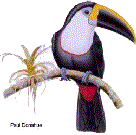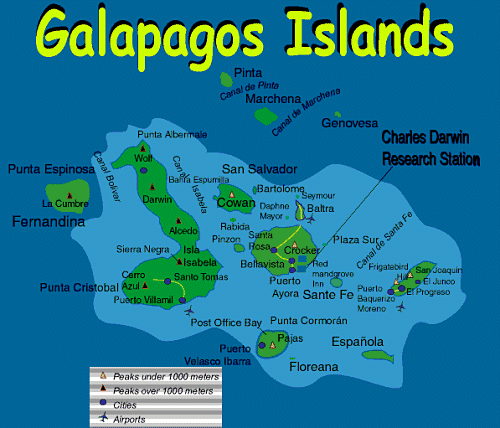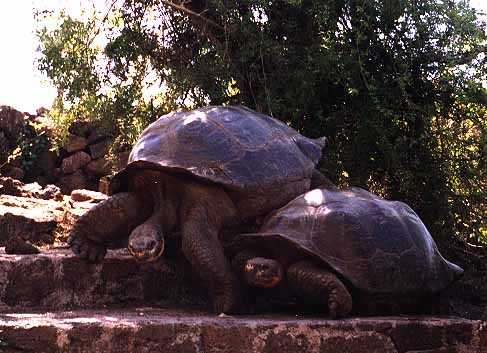
Friday:The buses were running again and we were able to leave Riobamba and get back to Quito by noon that day. At the bus station in Quito we had some difficulty getting a taxi back to our house. The taxi drivers had put there prices up because of the increase in the price of gasoline and the devaluation of the sucre. It ended up costing us about twice as much as it had before.
Saturday: In the morning we went down town Quito to do our laundry. Later in the day we went to visit the museo of Quayasamin walking up a very steep street but it was not open. There was a ceremonial service going on for him as he had died the week before. We then packed our bags to be ready for our flight to the Galapagos on Sunday. The return flight to the islands was $323.00 American and the boat tour was $625.00 American for five days. There is also a $100.00 US park fee to get on the islands. Not cheap.

Sunday: We flew to Baltra on Tame airlines stopping in Guayaquil where we went into the terminal for a short wait. The land around Guayaquil is very flat and wet looking. No wonder malaria is a problem there. We then flew on to Baltra, where a bus was waiting to take us to the Angelito, the boat we would spend the next four days on. Baltra is a flat and barren dessert like island. The entire landscape is covered with lava rock, cacti and wind blown trees. The island and the airport are occupied and run by the military as is the Tame airline.
We spent five days on the Angelito, a very nice boat with a crew of eight. It could take 16 passengers but there were only 11 on this trip. Peter and Carmel were Irish but had been living in San Francisco and were now spending some months traveling. Rachel and Adam were from New York State. Mary from California. Sue from Ottawa. Both these women were traveling alone. Two young women and one man from Switzerland. All very nice people and we all got along very well. Anyone interested could go snorkeling or swimming.
The food and the crew were great. Maya our guide was the wife of the captain. He and his brother owned the boat and one of them was always aboard. Maya was from Switzerland originally. She had come to Ecuador many years ago and stayed. She had met us at the airport in Quito and had her little son with her on the boat.
That afternoon we visited North Seymour. On one of our first dry landings some people met up with a territorial sea lion at the dock. These sea lions can be very aggressive so it is wise to keep out of their way.
I cant remember which islands some of these pictures were taken. During the next four days we visited the following sites
Day 1 Baltra/North Seymour
Day 2 Plazas/Isla Santa Fe
Day 3 PTA. Suarez/Gardener Bay, Isla Espanola
Day 4 PTA. Cormorant /Post Office, Isla Floreana
Day 5 PTO Ayora: Darwin Station/highlands, Isla Santa Cruz
The frigate birds and the blue footed Boobies were on North Seymour and the South Plaza . Santa Fe had Iquanas and cactus
You can not go on these islands without a guide and the trails are all marked. You are not supposed to go off these trails as the environment is very fragile. It is a very hot and dry environment. Lots of cactus on some of the islands, with an Iguana under each cactus tree. They wait for the leaves to drop and this is what they eat, thorns and all.
The thing that impressed me the most is that the animals and birds had no fear of humans and you could get very close to them. It is forbidden to touch or feed the animals.
On Isla Floreana we landed in Post Office Bay and checked the mail box. People leave post cards here for someone else to pick up and then mail the cards from their country. We walked to Punta Cormorant. We saw one flamingo in the lagoon as we walked on to Flour beach where the gray ghost crabs and the bright red sally lightfoot crabs scurry around the beach.
After lunch some of the passengers went snorkling at the Devils Crown. Ellen went in the boat but did not go in the water. Sue and I stayed with the boat and went swimming off the stern. As soon as we came out of the water the boat started off to pick up the people who had gone to the Devils Crown. When everyone was aboard we started the long ride to Santa Cruz. The dolphins swam beside us for awhile. They seemed to be having fun racing with the boat. It was a nice sunny day and everyone relaxed for the afternoon.
On the fifth day we visited the Darwin Research Center on Isla Santa Cruz. The main attraction here are the giant turtles bred in captivity to try and preserve the species. Many are becoming extinct in the wild.

Walking back to the town from the Research station we bargained for a few souvenirs from merchants on the street. Puerto Ayora is a pleasant town. I could see staying here for a few days. At the appointed time the bus driver picked us up to take us back across the island to the airport. On the way we stopped in the highlands to see the twin volcano craters just outside of Santa Rosa. The craters are filled with lush vegetation, mostly made up of scalesia forest and are truly monstrous. We wait to catch a ferry to Baltra and then another bus to the airport.
The flight stops in Guayaquil for about an hour and then on to the mainland. The weather was clear and we had a marvelous view of the mountains and Lake Quilotoa, a volcanic crater filled with water. We had hoped to take a tour there but with the strike we were not able to.
When we Arrived back in Quito the taxis were still on strike. Luckily an agent from the travel agent, Angermeyer's, was at the airport and she found us a driver to take us back to Ralph's
The Galapagos was great but very hot and we were happy to have just taken the five day tour. There had been no problems out on the islands because of the the strike.
Previous Page | Next Page